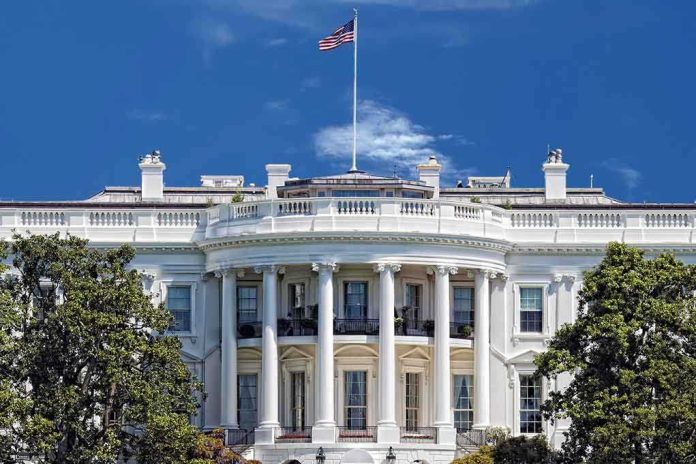
As the world watches, the White House is weighing a plan to rain down $50 million reward leaflets over the skies of Caracas—an audacious psychological gambit aimed directly at the heart of Nicolás Maduro’s regime, timed to shatter his birthday celebrations and potentially rewrite the rules of pressure politics.
Story Snapshot
- The U.S. considers a $50 million reward leaflet drop over Venezuela’s capital targeting President Maduro.
- Timed to coincide with Maduro’s birthday, the move blends psychological warfare with overt military posturing.
- The unprecedented bounty signals a dramatic escalation in U.S. covert pressure on the regime.
- Final authorization remains pending, but military assets are already in position as tensions surge.
White House Eyes Unprecedented Psychological Offensive
The White House’s proposed operation marks a radical escalation in the ongoing campaign against Venezuela’s embattled president. By circulating leaflets over Caracas that advertise a staggering $50 million reward, the U.S. aims to undermine both Maduro’s authority and the loyalty of his inner circle. The plan, still awaiting final approval, is designed to sow confusion and doubt within the regime’s ranks—particularly the military and security forces, whose allegiance is critical for Maduro’s survival. The leaflet drop would be timed for maximum psychological impact, coinciding with the leader’s 63rd birthday.
Military assets, including the Gerald R. Ford carrier strike group, have already arrived in the region, signaling that the U.S. is prepared to back words with muscle. The reward’s scale dwarfs previous bounties for foreign heads of state—a clear message that the stakes have never been higher. While similar tactics have appeared in conflicts from Iraq to Afghanistan, never before has the U.S. offered such a high price for information leading to the downfall of a sitting leader outside wartime conditions.
Deep Roots of Hostility: The Road to Leaflet Diplomacy
The origins of this high-stakes psychological operation trace back through years of deteriorating U.S.-Venezuela relations. After Hugo Chávez’s death in 2013, Nicolás Maduro’s ascent to power triggered American accusations of election fraud, human rights abuses, and rampant narcotrafficking. A disputed 2018 election and U.S. recognition of opposition leader Juan Guaidó as interim president set the stage for confrontation. By 2020, the Department of Justice indicted Maduro, raising the reward for his capture from $15 million to $25 million, and now reportedly to $50 million. Amid Venezuela’s economic collapse, hyperinflation, and mass emigration, the regime clings to power through its military and loyalists, making psychological tactics targeting these groups ever more critical.
Leaflet drops have a long history as tools of psychological warfare, but the combination of overt military presence and symbolic timing on Maduro’s birthday is a novel twist. The operation deliberately exploits moments of personal significance to maximize emotional impact and stress fractures within the regime’s support base. Analysts draw comparisons to Cold War-era tactics, but note that the scale and visibility of this plan set it apart.
Stakeholders, Risks, and the Balance of Power
At the heart of this gambit lies a complex web of stakeholders, each with distinct motivations. The U.S. government seeks regime change, justice for alleged crimes, and restoration of democracy, while Maduro’s regime aims to maintain power and resist foreign intervention. Venezuelan military and security forces, potentially swayed by the promise of enormous financial reward, hold the real balance of power. The opposition stands to benefit if the operation destabilizes Maduro, yet the risks of crackdown and backlash loom large.
International actors such as Russia, China, and Iran may respond as spoilers or mediators, complicating the outcome. Meanwhile, airlines and human rights groups raise concerns about civilian safety and the broader humanitarian consequences if instability deepens. The FAA’s warnings about hazardous conditions over Venezuela reflect the real-world disruption this operation could trigger, from air travel risks to economic fallout.
Potential Outcomes: Pressure, Backlash, and Uncertain Futures
Short-term effects could include heightened psychological pressure on Maduro and possible unrest within his military ranks. The leaflet drop may trigger confusion, defection, or even betrayal, but experts caution that the regime’s control apparatus is both resilient and practiced at suppressing dissent. Longer-term, the operation could erode loyalty to Maduro, but equally might provoke a hardline response, strengthening anti-U.S. sentiment or driving the regime deeper into the arms of external allies.
The broader precedent—using high-value bounties as instruments of foreign policy—raises questions about escalation, proportionality, and unintended consequences. Human rights organizations are likely to intensify scrutiny, and the risk of regional spillover remains. If successful, the operation may redefine psychological warfare tactics; if it backfires, it may entrench Maduro’s position and further polarize Venezuelan society.
Sources:
Ground News: White House Proposed $50M Reward Leaflet Drop Over Venezuela Capital
UPI: Trump May Drop Leaflets Venezuela Maduro Birthday
AVA Press: Controversial White House Plan to Drop Anti-Maduro Flyers Over Caracas












